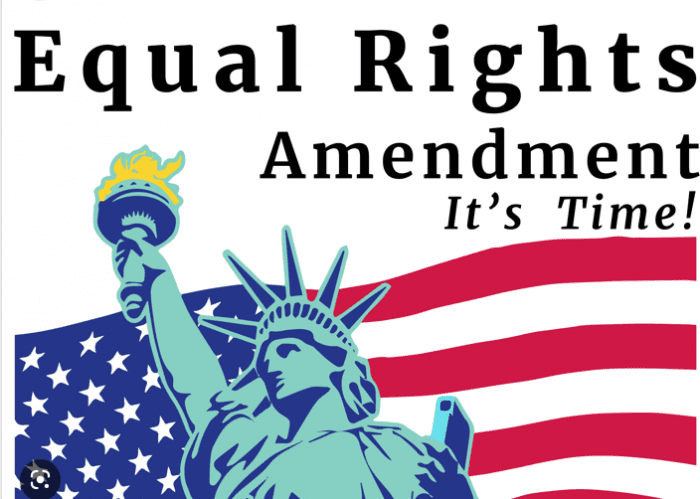Making Democracy Work: Passing the NYS Equal Rights Amendment will protect all New Yorkers
By Nancy Marr
An Equal Rights Amendment for the United States was first drafted in 1923 by two leaders of the women’s suffrage movement, Alice Paul and Crystal Eastman, who believed that the ERA was the next logical step following the campaign to win access to the ballot.
While the text of the amendment has changed over the years, its focus has remained the same. Article V of the U.S. Constitution requires that a proposed amendment be passed by the Senate and the House in a two-thirds majority in two consecutive legislative sessions in order to be sent to the states for ratification by their legislatures or conventions.
The version approved by Congress in 1972 and sent to the states with a deadline of 1979 reads: “Equality of rights under the law shall not be denied or abridged by the United States or by any state on account of sex. The Congress shall have the power to enforce, by appropriate legislation, the provisions of this article.” Although the deadline was extended to 1982, only 37 of the required 38 states ratified the amendment.
Opposition to it came from conservative Phyllis Schlafly, saying it would require women to serve in the military or lose protections for alimony or child custody cases. The result? Five states voted to revoke their ratifications, but these reversals were not counted as part of the result, and the count of ratifications remained at 37. The amendment was not passed.
In the absence of a national equal rights law, the constitutions of twenty-five states now do provide guarantees of equal rights on the basis of sex. The New York State Legislature, in 2022 and 2023, passed an ERA bill that has looked further. Currently, our state constitution only protects against racial and religious discrimination.
The proposed bill would protect all those who have been discriminated against based on ethnicity, national origin, disability, age, and sex, including sexual orientation, gender identity, gender expression, pregnancy, and a person’s reproductive autonomy or access to reproductive care. The new ERA bill explicitly includes language to clarify that discrimination based on a person’s pregnancy or pregnancy outcomes would be sex discrimination, protecting women from punishment. It will also ensure comprehensive and inclusive equal protection that will guard against attacks on our rights from the federal government or federal judges, including threats to the legal equality of LGBTQ1+ people.
Do we need protection if the Fourteenth Amendment already guarantees equal protection of the laws? The Fourteenth Amendment, passed in 1868, added the word “male” to the Constitution but failed to include women in the right to vote. The proposed New York State ERA is not “a women’s equality amendment” but seeks to protect women as a class and men as a class against discrimination under the law for any reason.
The Brennan Center has commented that the amendment process is an ineffective way to correct shortcomings in our United States Constitution. Given the difficulties and delays that have been faced by those who have fought for amendments, is our Constitution unamendable?
Congressman Jamie Raskin (D-MD) is the leading constitutional scholar serving in Congress today. Reflecting on the progressive activism that “built the modern Constitution,” Raskin urges reform-minded Americans to shed their fear of advancing reform through Article V. “It’s a betrayal of our history if we don’t talk about amending the Constitution in order to create a more perfect union,” he says. “We need to be planting flags in the unfolding history of democracy. That’s what the constitutional amendment process is all about.”
Voting to amend the New York State Constitution with the New York State ERA will provide protection for New Yorkers who have faced discrimination through the years. Make a plan to turn your 2024 ballot over and vote yes on the proposed amendment.
Nancy Marr is Vice-President of the League of Women Voters of Suffolk County, a nonprofit nonpartisan organization that encourages the informed and active participation of citizens in government and influences public policy through education and advocacy. Visit www.lwv-suffolkcounty.org or call 631-862-6860.







